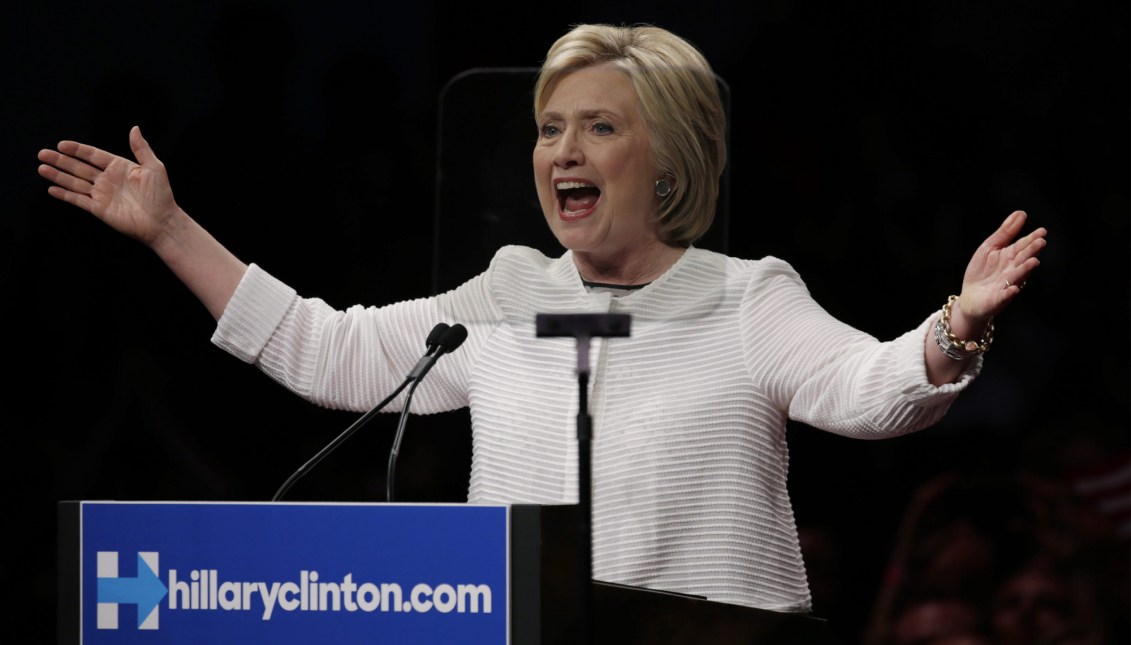
What would a potential Clinton administration mean to the Latino community?
Hillary Clinton all but clinched the Democratic presidential nomination Tuesday night when she won decisive victories in the California, New Jersey, New Mexico and South Dakota primaries.
Vermont Senator Bernie Sanders has vowed to keep fighting until the Democratic National Convention touches down in Philadelphia later this summer, but political number crunchers maintain that his chances of being the presidential nominee are slim to none. Despite his withering hopes, Sanders’ popularity has pushed Clinton further to the left on several hot topic issues.
So what would a potential Clinton administration mean to the Latino community and world at large? Below is a breakdown of her positions on several relevant issues:
Immigration
“We need comprehensive immigration reform with a path to full and equal citizenship. If Congress won’t act, I’ll defend President Obama’s executive actions – and I’ll go even further to keep families together. I’ll end family detention, close private immigration detention centers and help more eligible people become naturalized.” — HillaryClinton.com
Clinton has vowed to uphold Obama’s Deferred Action for Childhood Arrivals (DACA) and Deferred Action for Parents of Americans and Lawful Permanent Residents (DAPA). The executive orders, issued in the fall of 2014, would protect an estimated 5 million people from deportation and family separation.
While Obama’s initial announcement drew applause from many immigration advocates, 26 states subsequently sued, including Texas and Arizona, and a federal court blocked the executive orders in 2015. The issue remains before the Supreme Court, with the justices closely divided along ideological lines. It remains unclear whether Clinton could move past the impasse and uphold Obama’s immigration policy or if she will have to draft a new policy to circumvent the courts and conservative states.
Family Leave
“For many workers, staying home to take care of a sick child or an aging parent means losing a paycheck – or worse, even losing a job. That is an impossible choice we shouldn’t ask anyone to make – and yet American workers are forced to make it everyday.” — HillaryClinton.com
Clinton says she will guarantee both men and women up to 12 weeks of paid family leave and an additional 12 weeks for medical leave. The government would pay workers two-thirds of their wages while on leave. Money for that program would come from increased taxes on wealthy Americans.
Congress has proposed a similar policy, called the Family Act, but with money raised from an increase in the payroll tax. Clinton denounces the plan, however, because the burden falls on workers to pay an average of $1.61 more per week in taxes. Differing opinions on who would foot the bill leaves the door open for a potential showdown between Congress and a Clinton administration.
Minimum Wage
Clinton has come out in favor of increasing the federal minimum wage to $12, but says she would sign a bill increasing it up to $15. She prefers a lower minimum wage because it would present less of a burden to small business owners. Her comments have left the debate open for states to decide what which higher minimum wage is best for both its citizens and businesses.
Labor
“If we want to get serious about raising incomes, we have to get serious about supporting union workers.” – HillaryClinton.com
Clinton’s strong support for unions and, in turn, their support for her made the former secretary of state a shoe-in for labor rich states such as Pennsylvania. She has long touted her working class background and family’s association with Scranton’s industrial economy. As such, Clinton vows to strengthen unions, protect worker bargaining power, boost overtime benefits and support working families through equal pay and flexible leave policies.
She is also calling to enhance, not privatize, Social Security benefits. She would ask wealthy Americans to contribute more to the program, which analysts predict could run out of funds by 2034.
Latin America
Clinton has largely remained silent on her policies towards Latin America during this campaign season, although she has denounced Trump’s infamous wall building scheme and his attacks on a California judge with Mexican parents.
“I don’t know what else you can call these attacks other than racist, other than prejudice, other than bigoted,” she told MSNBC recently. “It’s just plain wrong, and certainly wrong coming from someone who is vying to become president of the United States.”
While Clinton calls for the protection, integration and betterment of Latinos in the United States, her track record in Latin America has been decidedly hawkish. She was linked to a 2009 U.S.-led coup in Honduras against democratically-elected President Manuel Zelaya. In response to that revelation, Clinton operative Jorge Silva has been quoted as saying that his candidate “is engaged in active diplomacy that resolved a constitutional crisis and paved the way for legitimate democratic elections.”
Clinton has also flip-flopped on the Colombian Free Trade Deal, first opposing the deal out of concern for “the history of violence” within that country. However, emails later revealed that she personally lobbied several democratic lawmakers to support the trade agreement.
“I oppose the deal. I have spoken out against the deal. I will vote against the deal, and I will do everything I can to urge the Congress to reject the Colombia Free Trade Agreement,” she said.
Clinton has historically supported free trade deals with Panama and Mexico, though she has since called the latter a mistake.
Racial Equality
A quick scan of the official Clinton website reveals this section to be one of the most robust. In it, Clinton promises to “the end the era of mass incarceration,” “protect immigrants’ rights and keep families together” and “defend every American’s right to vote.”
Her path to racial equality includes providing $2 billion in support to schools to reform “overly punitive disciplinary policies” that contribute to the school to prison pipeline. She calls for federal funding to support behavioral interventions and asks states to reform their disturbance laws. She would like to see schools and counselors address behavioral problems in minors rather than the justice system.
Clinton’s plan would also cut mandatory sentencing for nonviolent drug offenses that disproportionately affect black, Latino and Native American populations. She would provide $25 billion to “remove blight from neighborhood [and] remove barriers to sustainable homeownership.”
“The world is still changing and it’s up to us to shape that change, to build the future we want,” she said last year during a speech in Las Vegas.
Only time will tell what kind of change a Clinton presidency would bring to the country.










DEJE UN COMENTARIO:
¡Únete a la discusión! Deja un comentario.